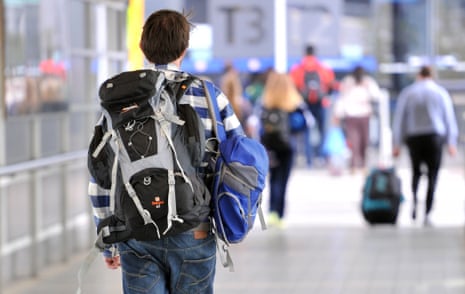The Community and Public Sector Union (CPSU) has kicked off two weeks of intermittent strikes at international airports.
The union gave two weeks’ notice of the strikes, but the intermittent nature of the stoppages gives them an element of surprise, maximising their impact and leading to warnings of delays.
CPSU members will take part in two weeks of rolling stoppages across the country from Monday to 9 October with strikes able to be triggered in 30-minute blocks all day, every day.
But unlike previous campaigns in the long-running dispute, the union has not given advanced notice of which airports they will strike at and when. The tactic makes it difficult for the Australian Border Force to roster on extra staff and bring in managers to cope with delays.
The strikes are part of a campaign to force the government to renegotiate its bargaining policy, which limits pay rises and calls for condition cuts, or to force the dispute to arbitration in the Fair Work Commission.
Reports on Monday suggested extra staff had been rostered on to cope with delays at Sydney airport and travellers were being warned of possible delays at all international airports, with Brisbane particularly affected.
On Monday a spokeswoman for the Department of Immigration and Border Protection described the disruption as “minimal”.
But in a statement when the strikes were first announced the department said the design of the strikes was “likely to create unreasonable levels of disruption and uncertainty”.
The CPSU national secretary, Nadine Flood, said the strikes were necessary because the government had refused “to sit down and find a fair and sensible solution”.
“The government is using nasty ‘starve them out’ tactics refusing to talk and keeping these workers on a three-year pay freeze,” she said.
“For almost three years all immigration and border force staff have seen is proposals to cut their existing rights and conditions and even cut some officers’ current take-home pay.”
She said more than 80% of immigration and Australian Border Force staff voted in March against an agreement which included cuts to conditions and a pay rise of just 1% per year.
When the strikes were announced in September the Tourism and Transport Forum (TTF) demanded that the CPSU and the government resolve the three-year industrial dispute.
The TTF’s chief executive, Margy Osmond, said: “We need to be presenting our best face to our visitors not embroiling them in a domestic workplace conflict.”
The immigration department and border force have said they would put in place contingency plans to minimise disruptions and the department said it would “do everything in its lawful powers to ensure that Australia’s national security and community safety are not put at risk”.
They have not indicated whether they will apply to the Fair Work Commission to suspend the strikes.
“The CPSU’s claim that the department is offering a pay increase of 4.7%, fails to acknowledge that the current offer represents pay increases of between 6.4% and 10.7% for the majority of staff across the department,” the department said in a statement.
In comments in September when the CPSU first announced the strike the minister assisting the prime minister for the public service, Michaelia Cash, who sets the bargaining policy, criticised the unions for disruptions.
“The CPSU remains more interested in organising and promoting industrial action that disrupts and inconveniences Australian travellers than ensuring their members receive a pay rise,” she said.
The former employment minister Eric Abetz, said in a statement on Monday that the CPSU was making “unrealistic claims” by seeking what he said amounted to a “12.5% increase [over three years] with zero productivity offsets”.
“After three years of obfuscation and stopping pay increases for their own members, it’s time the CPSU took a reality check,” he said.

Comments (…)
Sign in or create your Guardian account to join the discussion